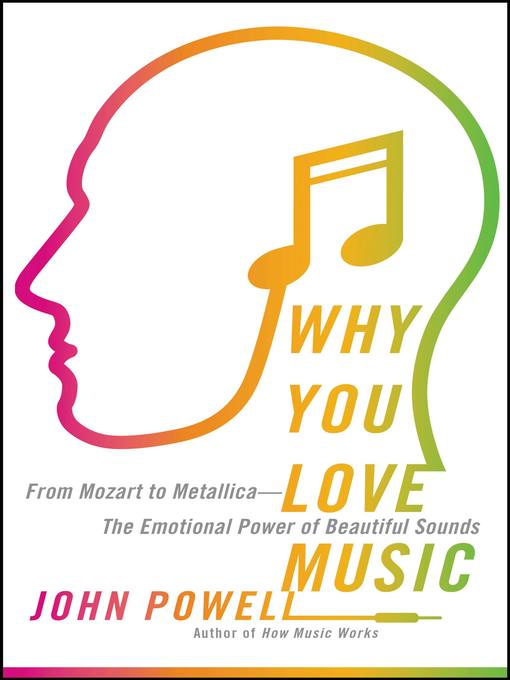
Why You Love Music
From Mozart to Metallica—The Emotional Power of Beautiful Sounds
کتاب های مرتبط
- اطلاعات
- نقد و بررسی
- دیدگاه کاربران
نقد و بررسی

March 28, 2016
In 2011’s How Music Works, British scientist and musician Powell provided readers with an engaging guide to the science of sound. In this follow-up, he takes the next logical step and explores why music is vital to human beings’ emotional, intellectual and physical existence. Chapters range from how music assists patients with Parkinson’s disease and depression and why movies are ineffective without sound tracks to such specific details as how Bob Dylan’s deliberately out-of-time vocals in “Make You Feel My Love” give listeners a sense of emotional clarity and why the 3:25 mark of “The Birds” by English alt-rock band Elbow gives him goose bumps. Powell draws on decades of other people’s research, filtered through his own charming sense of humor, to help readers hear music with fresh ears. Along the way, he also addresses the question of whether musical talent is innate or acquired, and proves that having babies listen to Mozart does not affect their intelligence. He delivers a solid case for why, indeed, people love (and need) music. A lengthy back-end section includes multiple appendices (or “fiddly details,” as Powell calls them) about such specific subjects as timbre, harmonizing, and scales and keys, capped by his top five listening suggestions in classical, jazz, and world music.

May 1, 2016
A buffet of insights and oddities regarding "the psychology of music."A professor of physics with a master's degree in music composition, Powell (How Music Works: The Science and Psychology of Beautiful Sounds, from Beethoven to the Beatles and Beyond, 2010) writes with a breezy style that belies his education. Much of this book involves the translation of scientific and academic research into the popular vernacular, with a wry, dry humor, proceeding from the account of how "early researchers" divided musical taste into two camps: "the posh and the rabble"--i.e., high and low culture, or classical and popular. Some of what the author offers about music's subconscious effect on the brain is fascinating--e.g., how certain types of music can not only make wine taste better, but will also affect how much you're willing to pay for that wine. Much of the rest, however, provides researched support for what has long been anecdotally obvious--that music can make us feel happy, that it has therapeutic powers to offset depression, that we respond best to music that is familiar and repetitious, that music is an important factor in developing and asserting our identities, and that we have less penchant for musical exploration after we've passed the identity-forging stage of adolescence and young adulthood. There's sort of a grab-bag feel to the book's organization, even before the appendices ("Fiddly Details"). The last proper chapter has the same title as the book, and its conclusion offers the answer to the question posed by that title: "Music has the power to alleviate depression, reduce perceived pain, help you cope with various illnesses and disorders, reduce boredom, aid relaxation, help you focus on a physical task, help you bond with others, reduce stress, improve your mood, and fill your life with emotions from nostalgia to joy. No wonder you love it." A succinct summation of all that has come before, much of which readers will already know before beginning the book.
COPYRIGHT(2016) Kirkus Reviews, ALL RIGHTS RESERVED.

April 1, 2016
British physicist and musician Powell continues his popular examination of music begun in How Music Works. Written in a breezy and engaging style, this book discusses the emotional power of music and presents current thinking on why music matters. Most of the author's conclusions are validated by research quoted within the text and fully cited in the notes. He examines a smorgasbord of issues: basic elements of emotion (fast, slow, happy, sad), repetition and surprise, music as therapy, as booster of intelligence, film music, tuning (Western music is slightly out of tune by design), and talent (shown mostly to be the result of diligence, not giftedness). The section "Fiddly Details" explains traditional concepts such as timbre, scales, and harmony. Many accounts have addressed the emotional influence of music: Anthony Storr's Music and the Mind; Oliver Sacks's Musicophilia; and textbooks such as the Handbook of Music and Emotion. The virtue of Powell's work is its research-based, accessible style. VERDICT Recommended for general music lovers seeking a popular presentation of the affecting power of music.--Bruce R. Schueneman, Texas A&M Univ. Lib., Kingsville
Copyright 2016 Library Journal, LLC Used with permission.

























دیدگاه کاربران